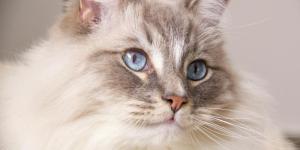Most Common Dogo Argentino Health Issues



See files for Dogs
As with any dog, breed is only one factor in determining their health status. Their experience, health care and other factors are major determinants, but genetics does play an important role. Especially with purebred dogs, there are certain diseases to which a dog has a greater genetic risk. The Dogo Argentino is no exception. A generally healthy dog when given the right level of care, they can be susceptible to certain health problems which any guardian needs to consider when adopting the breed. Some of these problems are related to their size, since the Dogo Argentino is a large dog breed with well-developed muscles.
At AnimalWised, we look at the most common Dogo Argentino health issues. We look at what diseases and health problems are more likely to arise in this breed, as well as what preventive measures we should take to ensure their health and a long life expectancy.
Is the Dogo Argentino a healthy breed?
Generally speaking, the Dogo Argentino is a healthy breed. They are a large dog breed from Argentina. Large dog breeds generally have a shorter life expectancy than smaller breeds. However, the Dogo Argentino is considered healthy for a larger dog breed.
One of the reasons larger breeds can have a shorter life expectancy is because their growth rate means they can put more pressure on their body. This can affect organs such as the heart and lungs, causing greater strain and resulting in faster deterioration of tissue.
Size is not the only factor which influences a Dogo Argentino's health status. There are genetic factors which are poorly understood, but predispose them to various health issues. Skin problems in the Dogo Argentino are particularly common. While they are not likely to be life threatening, they can reduce the dog's quality of life and make them vulnerable to secondary issues such as bacterial infection.
With this in mind, we take a look at some of the common health issues in the Dogo Argentino.
Congenital deafness
One of the biggest concerns of passionate Argentine Dogo owners is their genetic predisposition to the development of congenital deafness. Congenital deafness is related to a certain group of recessive genes that cause a deficiency in blood supply and poor oxygenation of the cochlea and the organ of Corti. Prolonged lack of oxygen causes irreversible damage to the nerve cells that transmit neuronal impulses and allow animals to interpret sounds.
The organ of Corti and the cochlea are key structures for the hearing mechanism in dogs. By not being properly oxygenated, their nerve cells deteriorate and die. As a consequence, the animal suffers an accelerated loss of hearing, developing deafness at a very early age.
One of the theories about hereditary deafness in the Argentine Dogo refers to the crossbreeding carried out for the creation of this breed. To increase their strength and physical resistance, numerous crosses were made with English Bull Terrier dogs. Currently, it is estimated that 18% of Bull Terriers are born with hearing problems and can develop deafness, making it also a common illness in this breed. It is likely the Dogo Argentino could have inherited this vulnerability from its ancestors.
Unfortunately, congenital deafness is a pathology that still does not have a definitive cure. Deaf dogs need specific care and must make periodic visits to the veterinarian to monitor the evolution of this condition.

Link between deafness and white fur in the Dogo Argentino
The genetic predisposition to congenital deafness was observed not only in the Dogo Argentino, but also in more than 80 breeds of dog and cat that have white fur. The Dogo Argentino is a breed which has exclusively white fur, although there may be a small patch of black on the head. Individuals which have other coat colorations are not considered purebred.
It is presumed that the presence of the recessive genes mentioned above would lead to an atrophy of the melanoblasts, preventing them from developing and forming melanocytes. These are the cells that carry melanin and allow pigmentation. The lack of pigmentation in the inner ear would be closely related to poor oxygenation of nerve cells and, therefore, congenital deafness in the Dogo Argentino.
We should stipulate that the Dogo Argentino always has white fur, but this does not mean they are types of albino dogs. Their skin and hair are completely white thanks to a dominant genetic characteristic typical of this breed. Albinism can appear in any species, being a congenital and hereditary condition derived from a recessive genetic mutation that affects a really small number of animals. Albino dogs are vulnerable to numerous biological deficiencies and require very special care .
Skin diseases
We can determine the pigmentation of their skin by separating their fur and looking underneath. With the Dogo Argentino, you will see the skin is white, although it will also have a pinkish hue. In addition to a genetic predisposition to deafness, they are also predisposed to skin problems. Among them we can include fungal, viral and bacterial dermatitis, as well as canine demodicosis as some of the most concerning.
Canine demodicosis, also known as red mange, is a skin pathology caused by the mite Demodex sp. skin mites. These mites usually settle inside the hair follicles of dogs' skin. Its presence is reasonably common among domestic animals, but excessive proliferation of the mite can cause demodicosis. Generally, this abnormal development of Demodex sp. is related to an immunological deficiency.
Affected animals show visible symptoms such as intense itching, excessive hair loss and notable inflammation of their skin. When these primary disorders are not treated quickly, the condition can evolve into a severe infection. Do not hesitate to immediately consult your trusted veterinarian if you notice any alteration in the skin or coat of your Dogo Argentino.
Remember to talk to the professional to find out about a possible specific diet which can help prevent skin problems. These diets are used to help boost their immune system and resist excessive proliferation of the mite. Preventive medications such vas vaccinations and regular deworming can also help prevent skin disease. With proper preventative medicine, your Dogo Argentino can maintain good health of their skin and coat.
Learn more about vaccination schedules for dogs and puppies with our related guide.

Sunburn
Excessive sun exposure is dangerous for all dogs, just as it is for all humans. Tis is regardless of their color, age or sex. However, albino or completely white animals are especially vulnerable to the sun's rays.
Due to its white skin, the Dogo Argentino has a greater predisposition to developing sunburn. The greater sensitivity to UV light also makes them more vulnerable to skin cancers such as squamous cell carcinoma in dogs. Although the breed originates in temperate climates with plenty of sunshine, this does not protect them from sun damage. If you live in a particularly sunny climate, they will need additional protection. We will also have to regularly monitor their skin for damage or aberrant changes.
Hip dysplasia
The Dogo Argentino is not commonly listed on lists of dogs prone to hip dysplasia. However, being a large dog that experiences accelerated growth, the Dogo Argentino can also suffer from this degenerative disease. Remember to offer a balanced diet and regular opportunities for physical activity to your Dogo Argentino.
Dogs will not always self-regulate their exercise levels. A boundless desire for activity means they can easily overexert themselves. For this reason, we need to be careful to offer moderate physical exercise to Dogo Argentinos and not to push them too hard for too long. This is especially important when they are senior dogs since their joints and bones experience greater levels of deterioration.

What is the life expectancy of the Dogo Argentino?
As we have detailed, the Argentine Dogo is a strong and resistant dog, but it has a notable genetic predisposition to develop a significant number of diseases. This does not mean they are unhealthy dogs. As with any animal, the health of an Dogo Argentino will fundamentally depend on preventive medicine, care and experience, in addition to genetics.
To keep your Argentine Dogo beautiful, healthy and balanced, remember to visit the veterinarian every 6 months, respect their vaccination schedule and provide periodic deworming from their first weeks of life. In addition, you should offer a balanced diet, regular physical exercises and suitable hygiene interventions to improve their physical and mental resistance.
Physical health protection is not the only factor in determining the lifespan of a Dogo Argentino. It is just as important to stimulate their cognitive, emotional and social capacity. We should do so by ensuring proper socialization in the dog from the time they are young, as well as provide appropriate training and education throughout their lives.
Although we cannot guarantee the health of any animal, providing the right level of care means we can expect an average life expectancy of between 9 to 15 years in the Dogo Argentino. This is considered relatively long in large dog breeds.
This article is purely informative. AnimalWised does not have the authority to prescribe any veterinary treatment or create a diagnosis. We invite you to take your pet to the veterinarian if they are suffering from any condition or pain.
If you want to read similar articles to Most Common Dogo Argentino Health Issues, we recommend you visit our Hereditary diseases category.








